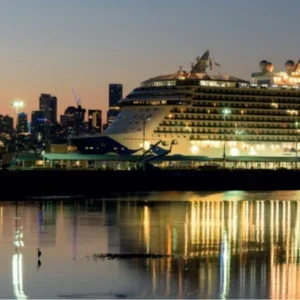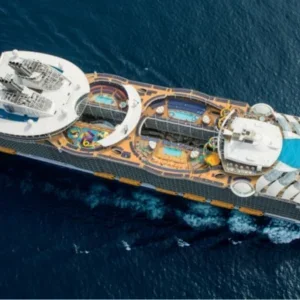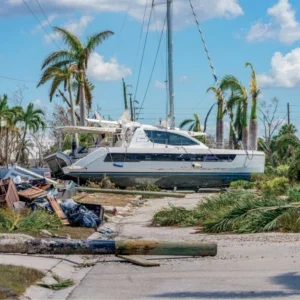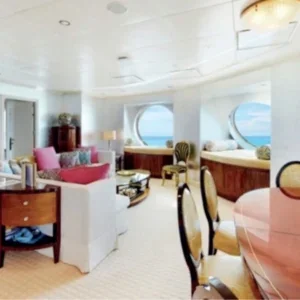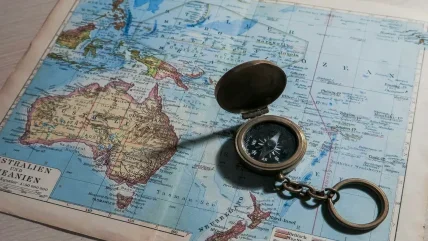
Since the age of discovery, our thirst for adventure has taken us to the seas, sailing across continents in search of new sights. Columbus, Cook and other explorers faced perilous conditions and cramped cabins on their expeditions. In contrast, the past decade has seen recreational voyagers experience the world in style aboard luxury cruise ships. With voyages to incredible geographic locations becoming a must for daring tourists, there is also a desire to learn about the intriguing locations being explored.
“People are curious and adventurous, and the world has become so much more accessible, so naturally they want to explore further,” says Florence Kuyper, Aurora’s expedition leader. “Ships can bring you to places where no road goes.” Aurora runs trips to the polar regions aboard its fleet of small low-emission vessels, including the European and Russian Arctic, Antarctica, Latin America, Alaska and Canada, the British Isles and more – many of which are so remote they are only accessible by boat. This also means that there is not much human activity in these places, so “nature dominates” in Kuyper’s words. “To me, that is one of the most powerful experiences one can have,” she says, “to realise that we’re visitors, that nature is totally indifferent to us and way more powerful than we are.”
Appreciate nature’s beauty
On these adventures, guests can expect to spot whales, seals, penguins and polar bears, as well as lichens, moss and special rock formations, and with the information provided by the guides, they can learn about the ecosystems around them. “It helps people connect to the environment,” says Kuyper, who also gives lectures on board about these topics.
From trying to find different species of penguins and observing whales to guided hikes, Kuyper involves guests as much as possible in making decisions for their excursion, but sometimes nature makes the decisions for them. “Almost every day I am surprised. Often, we have a plan, but that may need to be altered because of ice or weather conditions. In that case, we go with plan B or even C, and the funny thing is that frequently we experience something better than I had originally planned,” reveals Kuyper.
“The guests love it, and it’s easy to understand why – nature is just magic,” she adds, recalling the unforgettable views across the ice fields, and one unexpected experience of being approached by a minke whale.
Seabourn runs cruises that focus on the Arctic, with itineraries also visiting Iceland, Greenland, Canada, the Caribbean, Central and South America, Russia, New Zealand, Australia, Patagonia and the Antarctic. Jen Martin, the director of expedition product development at Seabourn, explains that every voyage is focused on education about the destination – the wildlife, geology, history and archaeology of an area – with an expedition team of 26 on board to facilitate this. “They will accompany every excursion on shore or in Zodiacs, offering commentary and information, and will present educational programmes on board the ship,” she says.
To get a sense of what each guest is interested in, Martin says that the team makes sure to spend a lot of time getting to know them on and off the ship, making a point of socialising with guests and joining them for meals. Intrepid Travels takes its passengers to remote parts of Antarctica, the Falklands and South Georgia, which its polar manager Simon Evans describes as being “some of the most extreme environments in the world”. Each daily excursion sees an expedition team venture out with a maximum of eight guests per guide, meaning there is always someone on hand to answer any questions about the area they are exploring.
Evans notes that these excursions also serve as an eye-opening way to see the effects of climate change first-hand and truly appreciate the strain it has put on the natural world. “People often return feeling more passionate about the need for us to look after our planet,” he notes.
Similarly, Martin says that Seabourn’s expedition team feels a sense of responsibility to help guests better understand the effects of climate change on the wild and beautiful places they visit, and the creatures that call them home. “Change and species loss around the world are very real things and many people have chosen to visit some of these remote destinations because they want to see them while they’re still wild,” she shares. “Without the education to complement the experience on shore, however, the message is sometimes lost.”
When combined with awe-inspiring experiences of humpback and killer whales in the Antarctic or being able to approach the penguin colonies of the Antarctic Peninsula, South Georgia Island and the Falkland Islands to watch them building nests and rearing small chicks, education is often the most powerful instigator of change – and these expeditions are able to offer that rare glimpse. “We often see crabeater seals or leopard seals on Zodiac cruises and Weddell seals are sometimes onshore near our landing sites,” Martin relays. “We do everything possible not to affect their behaviour or life cycle with our presence, but we are lucky enough to experience them close up.”
A unique experience for every explorer
Increasingly, vessels are offering educational packages curated for the curious among their guests, but the focus has to be on finding a balanced educational approach to suit different guests’ desires, because as Kuyper states: “It’s all about giving them an experience they will never forget.”
On board an Aurora vessel, guides cover a range of topics in the lecture theatre, from stories about explorers to the swimming techniques of a penguin. Similarly, Intrepid expeditions include daily lectures from all manner of scientists, hosted in the ship’s presentation lounge. But how much information is too much? “I find that genuine enthusiasm is never overbearing for our guests,” says Kuyper. “That’s what we’re bringing – often guests tell us it’s contagious and thank us for reminding them how important it is to do something you are passionate about.”
“People are curious and adventurous, and the world has become so much more accessible, so naturally they want to explore further.”
Florence Kuyper
For the ardent nature enthusiasts, both Aurora Expeditions and Intrepid Travel run a citizen science programme, where passengers are invited to assist with all kinds of data collection, which contributes to scientific research projects. For Aurora, these include cloud observation, seal recognition, seabird counting and whale photography, explored further in the on-board science centre. “All of these are really interesting and worthwhile projects, and getting involved gives our guests and the trip they are making an additional purpose,” explains Kuyper.
Intrepid’s data collection is geared towards sustainability, helping scientists better understand the issues facing Antarctica, such as global warming. “Because of this,” Evans says, “you’ll experience this incredible part of the world in a way that builds human connection, supports local communities and respects the environment.”
Aurora ships have their own library with windows that afford magnificent views while guests read up on the day’s destinations and wildlife – but there is also ample opportunity to unwind on board. With jacuzzis, a sauna and the option to book a massage, this is a far cry from conditions faced by early explorers. Cabins are calming and neutral, some with private balconies and adjoining staterooms. Furthermore, Intrepid’s Ocean Endeavour has its own heated saltwater pool, and regular yoga classes. Seabourn’s on-board spa offers guests a mindful living programme.
As the desire to travel grows following the pandemic, there has been an influx of bookings for 2022 and 2023 aboard smaller expeditionary vessels, which appeal to guests wishing to eschew large groups in favour of a more intimate atmosphere. And as spaces aboard expeditionary ships continue to sell out, supply will naturally start to match demand. Evans hopes that such cruises will improve green policies and practices.
“We have to be conscious as an industry of the fragile nature of the polar regions,” he says. Martin echoes this sentiment. “In the future, I hope to see companies continue to focus on responsible visitation of fragile places,” she states. “As the industry grows, we are going to need to continue to keep this at the forefront of our operations and our focus.”
Ultimately, you can bet that with people increasingly venturing to the most remote corners of the Earth, so too will they flock to the lecture theatres on board to fully appreciate the experiences they have had – and in turn will come away with a stronger sense of urgency to protect the beauty of the natural world.
More adventurous than ever
Australia’s adventure cruise company, Aurora Expeditions, has launched its expanded 2022–23 season brochure introducing its Arctic, Antarctica and global programme. Aurora Expeditions’ season of voyages features 16 new itineraries and several returning favourites, while Aurora’s new state-of-the-art ship, the Sylvia Earle, is also making its debut as part of the 2022–23 season. The new brochure additionally provides a first look at the company’s newly expanded citizen science programme.
“Aurora Expeditions’ 2022–23 season is sure to provide the captivating and perspective-altering experiences that our guests continue to return for,” commented Monique Ponfoort, CEO of Aurora Expeditions.
Along with Aurora’s Antarctica programme, new itineraries that are featured in the 2022–23 season include Aurora Expeditions’ first ever voyages to Alaska by way of its own vessels, as well as journeys to the north-west passage, the marine biodiversity hotspot of Raja Ampat and West Papua Islands, and more.
Source: Aurora Expeditions


